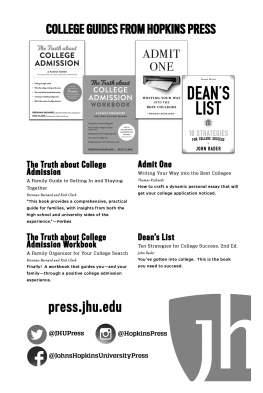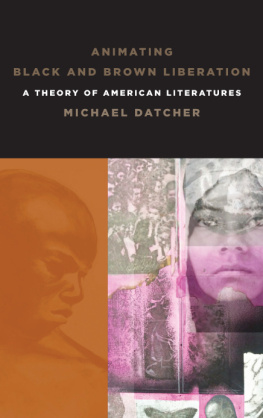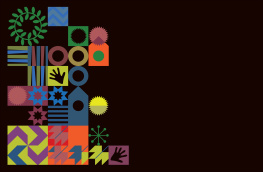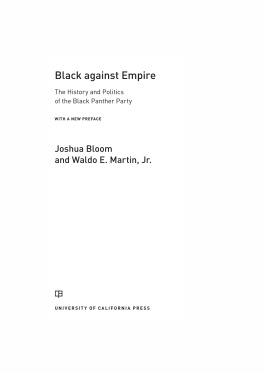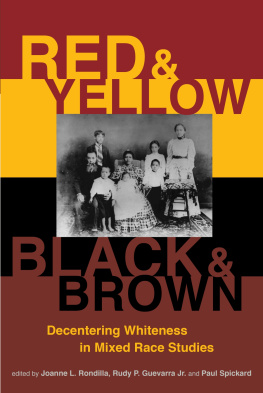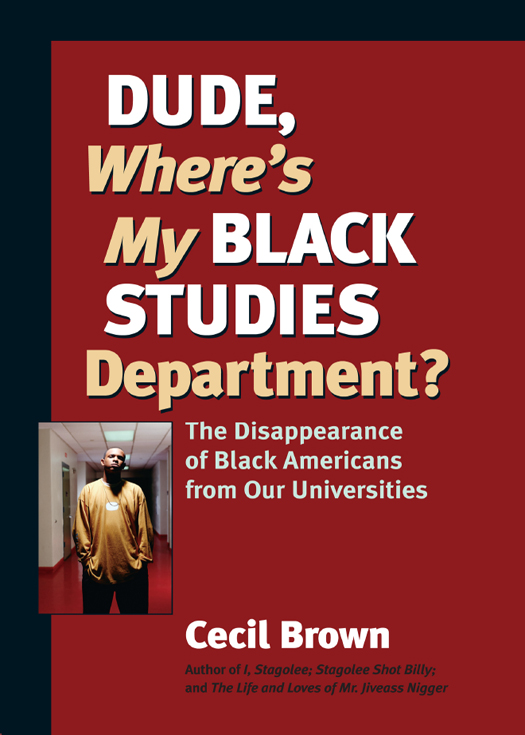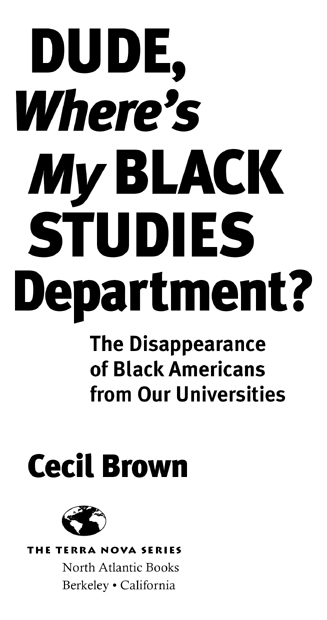Other Books by Cecil Brown
I, Stagolee
Stagolee Shot Billy
Life and Loves of Mr. Jiveass Nigger
Days Without Weather
Coming Up Down Home
Copyright 2007 by Cecil Brown. All rights reserved. No portion of this book, except for brief review, may be reproduced, stored in a retrieval system, or transmitted in any form or by any meanselectronic, mechanical, photocopying, recording, or otherwisewithout the written permission of the publisher. For information contact North Atlantic Books.
Published by
North Atlantic Books
P.O. Box 12327
Berkeley, California 94712
Cover design by Paula Morrison
Dude, Wheres My Black Studies Department? is sponsored by the Society for the Study of Native Arts and Sciences, a nonprofit educational corporation whose goals are to develop an educational and crosscultural perspective linking various scientific, social, and artistic fields; to nurture a holistic view of arts, sciences, humanities, and healing; and to publish and distribute literature on the relationship of mind, body, and nature.
North Atlantic Books publications are available through most bookstores. For further information, call 800-733-3000, or visit our website at www.northatlanticbooks.com.
Library of Congress Cataloging-in-Publication Data
Brown, Cecil, 1943
Dude, wheres my black studies department? : the disappearance of black Americans from our universities / Cecil Brown.
p. cm.
eISBN: 978-1-58394-391-5
1. African-American college students. 2. College attendanceUnited States. 3. College dropoutsUnited StatesPrevention. 4. African-AmericansStudy and teaching. I. Title.
LC2781.B76 2006
378. 1982996073dc22
2006024637
v3.1
This book is dedicated to my nephews: The DozensLionel, Casey, Little Stevie, Big Stevie, Shaun, Jason, Harold, Bryan, Demetrius, Morton, Ty, Kevin.
T ABLE OF C ONTENTS

F OREWORD

FromStupid White Mento Smart White Man
The Legacy of Black Power and the State of Americas Bad Education
I am writing this book because the voice of the Black manimportant as it isis disappearing. In early December 2004, I took a stroll across UC Berkeleys campus. It was a lovely winter day, and I couldnt help but notice the absence of Black students. I was saddened to see so few African Americans on the campus. Where were they?
Heading leisurely down a wooded path on my morning ramble, I passed by the Campanile and Moses Hall; I recalled my days at UC Berkeley, first as a teacher in the English Department in 1968 and later as a PhD student in the early 1990s. I remembered other Black students from those days in my classes.
If I could have put my perceptions into statistics, I walked among a student population composed largely of Asian Americans (40 percent) and Whites (35 percent). As I crossed a small wooden bridge with a brook flowing beneath, I realized I had seen only one or two of us on campus. I thought, where has everybody gone?
It was as if I were one of the characters in the film Dude, Wheres My Car? and had awakened from a long, extended party, only to realize that I couldnt find my Black presence on campus, which is dependent upon both a strong Black student body and a good Black Studies department. Even further back, say in 1987, you would see a Black presence in all walks of student life at UC Berkeley and, indeed, in all walks of life in universities across the country. But now, the number of Blacks that matriculate at UC Berkeley is very small. Even though the university claims to want to attract more good Black students, it seems not to occur to them that hiring more good Black faculty would make the school much more attractive to promising young Blacks.
Earlier that year, I was in my car listening to a radio talk show and I heard a voice say, I am done with hiring White people. Nothing against them personally, of course. Theyre a dependable, hardworking lot but theyre White and for that reason Ill never hire another White person.
The voice continued, If you are interested in making film, and you are Black, let me know.
Who was this? Was it a White man? It couldnt be a Black man because what Black man would say such a thing in the time of Bush Administrations? The voice was now clearly that of a White man, but which White man? If youre an African American and youd like to work in media, then I encourage you to drop me a line and send me your resume. I waited patiently to hear who this guy was. Eventually, the announcer said, Michael Moore, thank you!
Michael Moorethe guy who did Fahrenheit 9/11?
Michael Mooreyes, it was him. But he sounded like a Black guy. And that was when I realized that he was speaking as a Black man, that the voice of Black people had become so submerged, so suppressed in both the media and daily life, that only a White man had the license to express it. It was then that I decided that the next time Michael Moore was in town, I was going to meet and thank him.
I didnt have to wait long. A few weeks later, a month or so after the 2004 election, I read in the paper that he was appearing in Marin County. I went to San Rafael, a beehive of White, wealthy, well-scrubbed liberals, and waited for an hour. The theater was tense with happy anticipation by the time he finally arrived, late.
Moores speech was uplifting, full of opportunities to laugh at liberal illusions and to bemoan the cleverness of the right wing. Bush, he saidbegrudgingly giving the Devil his duehad a plan, he had a story. Bushs story was, he said, simple and direct. It was that Bush had gone to New York City after September 11, 2001, and he had seen there was an enemy out there, and he had decided to go after that enemy. His story, Moore said, was I will protect you. Very simple. Then he asked the audience, What was Kerrys story? The audience laughed. Kerrys story was, My story is like Bushs story!
The audience was working toward a catharsis. Michael Moore made us feel better about losing the election, about being Blue. After that he launched into an attack on the weak Democratic Party in Sacramento. We had many a good laugh that evening.
During the question and answer period, I raised my hand. He acknowledged it and, when I stood to ask my question, I could see the surprised look on the faces of the two hundred or so upper-class, Marin County Whites. They hadnt expected to see a Black man in their midst.
I heard you on the radio, and you said you wanted to help African American filmmakers. You said that you wouldnt make a film without having Blacks work on it. Why are you doing this? What is the basis of your goodwill towards Black filmmakers?
To my surprise, the audience broke out into applause. After a few moments, Moore raised his head and said in a muffled, inarticulate stammer, I was thirteen years old, getting out of the car with my parents. Somebody said, They just shot Martin Luther King. A cheer went up. I was thirteen. Uh, this was one of those moments when you go, Okay, fuck this. I want out of this place. That experience, hearing someone cheer the assassination of Martin Luther King, made him want justice for Black people from then on.


